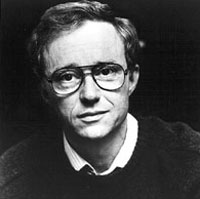 |  |
 |  |
 DAVID GROSSMAN Israeli Novelist & Nonfiction Writer |
March 12, 2001 (Tuesday) 4:00 Informal Seminar Assembly Hall, CC 8:00 p.m.Reading & Discussion Recital Hall, PAC (Introduction by Daniel Grossberg) Both UAlbany, Uptown Campus |
Israeli writer David Grossman first achieved international recognition with the publication of his book, The Yellow Wind (1987), a nonfiction account of the Arab-Israeli conflict that was widely praised for its compassionate, humanizing depictions of both sides. Since then Grossman has continued to pile up acclaim for his thought-provoking, yet entertaining accounts of that struggle in a number of different formats. A writer of five novels, two nonfiction efforts, a play, and several children's books, Grossman' s books refuse easy categorization. He has been hailed by some as Israel's best journalist and compared by US reviewers to such literary luminaries as Gunter Grass and Gabriel Garcia Marquez for his seamless weaving of fantasy and reality. Grossman utilizes a wide range of literary devises--especially frequently shifting voices and points of view--to force into relief the more human aspects, dimensions, and repercussions of the ongoing Middle Eastern conflict
The Yellow Wind Grossman's first book published in the states (1988), caused a sensation upon publication. Geraldine Brooks in The Wall Street Journal declared the book, "Invaluable. It should be alongside the road maps at Ben-Gurion Airport, for it is a map of the psychological distances that now separate not only occupier from occupied, but willing from unwilling conquerors." Walter Reich in the New York Times Book Review said, " All are bound to learn something about the conflict they never knew before, something that illuminates the news and the reality that produces it. ..something deep and achingly, damnably true."
Grossman' s first novel The Smile of the Lambs, was also inspired by the Israeli occupation of the West Bank. The book is narrated by four different characters, each of whom are subjected to a wide array of pressing political, philosophical, and personal dilemmas that threaten to overrun their lives.
Grossman's second novel, See Under: Love, follows the experiences of Momik, the child of Holocaust survivors, as he attempts to understand and reimagine the experiences of his relatives. The book drew praise for its innovative blend of modernist literary techniques and sensitive portrayal of a young boy. Michiko Kakutani in her New York Times review called the book, "a remarkable and important novel [that] tackles the pivotal literary and philosophical issues spawned by this sad, tormented age."
Grossman's latest novel, Be My Knife (2002), is a departure from his earlier works. It tells the story of a shy, neurotic bookseller who reaches out in loneliness to a beautiful stranger he sees at a class reunion.
David Grossman has won numerous awards for his writing. Among them are the Prime Minister's Prize for Hebrew Literature, the Israeli Publisher's Prize for best novel, the Vallombrosa Prize, and the Nelly Sachs prize. He has worked as a journalist for a number of publications, including Kol Israel (Israeli Radio ). He lives in Israel with his wife and two sons.




| Judaic Studies |